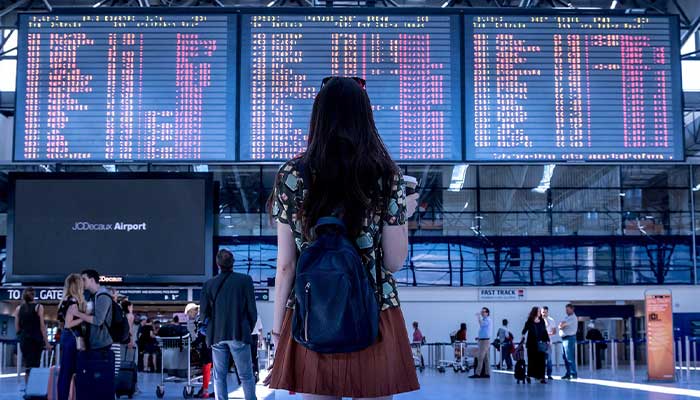Incorporating Ai in travel industry and tourist management domains has made the lives of passengers globally more comfortable. In airports, for instance, facial recognition systems and airport security scanning equipment are examples of AI applications that are often utilized today.
Artificial Intelligence is a computer science department in which machines and computers impact human intelligence. In artificial intelligence, devices are assumed to think like humans and execute jobs only humans can do. In addition, it capitalizes on human problem-solving and decision-making abilities.
AI is a novel technology and a rapidly expanding combination of extensive information, machine training, and expert techniques. For instance, AI activities such as self-driving vehicles and space-exploring robots gain experience. In addition, research is ongoing into using more advanced AI technologies, such as Generative Adversarial Networks and Edge AI, in many industries.
How ai is changing the travel industry?

To Determine Valuable Insights Using Data Analytics
Every second, a substantial amount of data is created everywhere in the travel industry. However, if travel companies can do these analyses rapidly and determine what has worked well for consumers, these data might be valuable assets. In addition, travel companies use AI to distribute these massive data sets quickly and accurately, which would be a hard task for people alone.
AI in travel industry: The Data Analysis of the Dorchester Collection Hotel
Using its AI platform Metis, the Dorchester Collection hotel has analyzed customer feedback reviews, customer surveys, and online polls to monitor its overall execution. They have observed a lack of customer loyalty to their hotels through the data above. As a result, organizations can create more effective customer-centric solutions by identifying such customer trends.
Social Media Sentiment Evaluation
If you find social media enjoyable, you deserve all the credit. This technology, coupled with AI, is utilized by airlines and hotels to recognize travelers’ social media feedback about their journey. For example, assume consumer tweets on social media about a flying difficulty expressing frustration. In such a scenario, a listening tool will examine and communicate with the customer in real-time.
AI In Travel Industry: Room Mapping and Dynamic Price Monitoring
Using AI for Room Mapping monitors the dynamic pricing offered by multiple providers for the same room. When incorporating AI to predict dynamic values for a particular room, we obtain a precise sense of when and how long the price will be at its lowest.
Smart Baggage Handling
Airports sell millions of cases and bags annually. SITA, an airport IT expert, offers AI potential for airport bag-checking systems. Robotics and AI have the potential to automate airports fully, and misplaced bags will be actively pursued. There are currently operational AI solutions in airport pilot programs. For instance, the Eindhoven Airport has successfully utilized AI-powered baggage handling systems without baggage tags.
AI Travel Booking Assistants
Artificial Intelligence assistants and Smart chatbots have supplanted travel agents as the means for commuters to book flights and rent vehicles online. In addition, these chatbots are integrated into social media platforms such as WhatsApp, Facebook Messenger, Skype, and Viber to provide users with a more customized booking experience.
Chatbot of Skyscanner
When initiating the Skyscanner chatbot on Facebook or Whatsapp, users can enter their destination to begin a discussion with the bot. If you do not know where to travel, write ‘anywhere,’ and the bot will provide choices, including the price for each place based on your real-time search preferences.
Face-to-Face Customer Service Robots
In the travel sector, robots are gradually replacing human customer service representatives, eliminating the necessity for human employees. The days of waiting in line to obtain information or locate your entrance at a crowded terminal are long gone. Some modern airports and hotels are now equipped with robots to assist you in the scenarios above.
Applications Powered By AI For Flight Forecasting
Imagine a cutting-edge system that helps you find the best flight fare at the optimal moment and provides advance notice of scheduled trip expenses. Some businesses have made this valuable feature a reality by incorporating AI-driven intelligent price prediction into their operations. Hopper is an example of travel management that provides this ease.
Hopper is based on methods for machine learning. It leverages a flight database to predict ideal hotel costs and airfares while providing consumers with individualized tips regarding the best time to book travel. When a traveler tracks a flight, the system determines whether they should purchase it immediately or wait for a better price.
Robotics and Voice-Assistant Technologies
As a result of the Covid-19 pandemic’s devastating impact on the travel sector, specialists are searching for more modern contactless check-in and checkout procedures and assisting passengers with general questions.
Consequently, self-service can improve the norm during the post-pandemic period. Previously, voice assistants were utilized extensively on ships, in hotel rooms, and for airport security. Given the state of affairs, the sector can foresee the emergence of robots and voice assistants.
Customized Travel Planning
The growth of smartphone applications that allow customized end-to-end travel planning is expected to increase travel outlining in the next years. These apps may provide new features, such as combining wearable technology to monitor passenger health and propose safe travel zones.
Conclusion Each hue has experienced an influx of AI applications in travel and tourism. In the preceding article, popular AI applications and their operation were discussed. Whether traveling by air or sea, there are opportunities for travelers and travel firms to utilize AI to make the journey more efficient and enjoyable while maintaining customer satisfaction.
